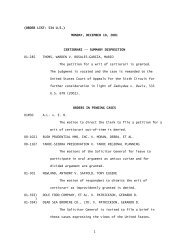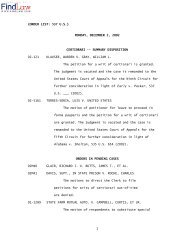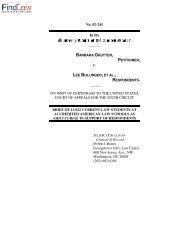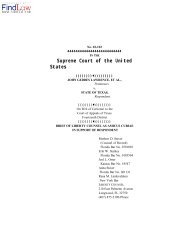No. 01-1757 Stogner v. California - FindLaw: Supreme Court Center
No. 01-1757 Stogner v. California - FindLaw: Supreme Court Center
No. 01-1757 Stogner v. California - FindLaw: Supreme Court Center
You also want an ePaper? Increase the reach of your titles
YUMPU automatically turns print PDFs into web optimized ePapers that Google loves.
2<br />
applied retroactively; others opined it would violate ex post<br />
facto principles. Still other courts found no statutory or<br />
constitutional bar to applying the statute retroactively. See<br />
People v. Frazer, 21 Cal. 4th 737, 745-46 & nn.5-8, 982<br />
P.2d 180 (1999) (discussing history of the provision), cert.<br />
denied, 529 U.S. 1108 (2000).<br />
In 1996, the <strong>California</strong> Legislature responded to those<br />
courts that were reluctant to apply the statute retroactively.<br />
By nearly unanimous vote, the Legislature<br />
amended section 803(g) to expressly state its intention<br />
that the law be applied retroactively. The amendment also<br />
made explicit the Legislature’s intent to revive previouslyexpired<br />
causes of action if the requirements of section<br />
803(g) were met. See People v. Frazer, 21 Cal. 4th at 746-<br />
47; see also infra notes 6 and 7 and accompanying text.<br />
Three years later, in People v. Frazer, 21 Cal. 4th 737,<br />
the <strong>California</strong> <strong>Supreme</strong> <strong>Court</strong> addressed the questions of<br />
whether retroactive application of section 803(g), on its<br />
face, violated the Ex Post Facto Clause or the Due Process<br />
Clause of the United States Constitution or the <strong>California</strong><br />
Constitution. That <strong>Court</strong> held that retroactive application<br />
of the statute was not barred as a matter of either federal<br />
or state constitutional law. A retroactive change in the<br />
statute of limitations, the court found, does not fall within<br />
one of the four proscribed categories of laws that violates<br />
ex post facto principles. The expiration of a statute of<br />
limitations also confers no fundamental right, and, because<br />
<strong>California</strong> Penal Code section 803(g) is well-suited to<br />
addressing the serious concerns that prompted the statute,<br />
it does not violate substantive due process. The defendant’s<br />
protection from the prejudicial loss of evidence, if<br />
any, the court held, would come from procedural due






